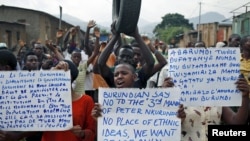A group of 17 political parties have agreed to boycott elections in Burundi because they don't believe they will be free and fair, an opposition leader said Thursday.
The opposition groups also are opposed to the current electoral commission because it isn't complete after two of its five members fled, said Frederic Bamvuginyumvira, deputy head of a party known by its initials as FRODEBU.
Burundi has been rocked by unrest since President Pierre Nkurunziza announced his plans to run for a third term, which many see as unconstitutional even though the nation's constitutional court has ruled in the president's favor.
Security forces have used a combination of live ammunition, tear gas and water cannon to break up groups of protesters in the nation's capital, Bujumbura. At least 20 civilians have been killed and hundreds more wounded in the clashes.
Amid the chaos, which has forced about 90,000 people to flee to neighboring countries, the government is pressing ahead with elections, saying any lengthy delay would lead to a dangerous power vacuum and possibly more violence.
Presidential elections are now scheduled for July 15 and parliamentary polls will take place on June 29.
Stalled negotiations
United Nations-backed talks between the government and the opposition appear to have stalled after opposition leaders and civic groups rejected U.N. diplomat Said Djinnit of Algeria, who had been facilitating the talks aimed at creating an environment for credible.
In a statement Thursday, Djinnit, who remains the U.N. chief's special envoy for Africa's Great Lakes region, signaled he was quitting but urged the parties to continue their dialogue and to avoid violence.
Nkurunziza came to power in 2005 and won a second term in 2010. That election also was marred by violence, and he won re-election after running unopposed following an opposition boycott.
He maintains he is eligible for a third term because parliament elected him for the first term.




